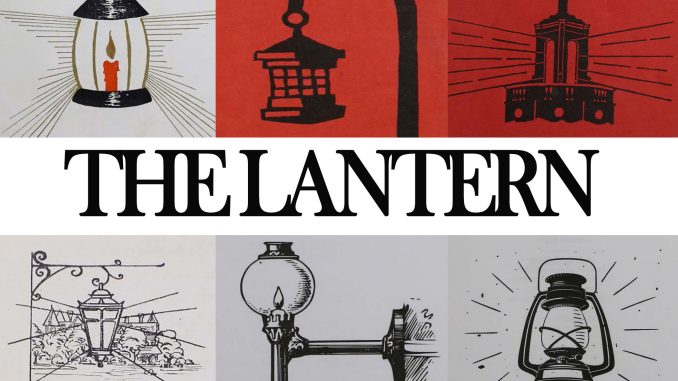
Ursinus writers, your moment in the sun has returned: October is The Lantern’s submission month.
As one of the longest-running literary magazines in the United States, The Lantern has been in publication since 1933. It has been a fixture in the Ursinus community since its inception. Ninety-eight different editors-in-chief and thousands of works have contributed to its illustrious history, and this year will add another chapter.
This year is particularly notable, however. For the first time since 1987, creative writing professor Jon Volkmer will not be advising the operation due to transitioning toward retirement. The Lantern’s torch has now been passed to fellow creative writing professor Dr. Katie Schmid Henson. When asked about the transition, Dr. Volkmer was not worried. “The transition is easy because Dr. Henson is a professional who knows how literary magazines work, and she has the people skills to assemble and guide a great staff…I look forward to watching it grow and evolve in both its editorial processes and its visual presentation. Dr. Henson brings a fresh perspective on both.”
The Lantern accepts works in four categories: fiction, creative nonfiction, visual arts, and poetry. Artists can typically submit up to four pieces. Additionally, one can apply to be a reader or editor on the staff. This year, there is a one-credit course for aiding in creating and promoting the magazine.
One person who is very familiar with the ins and outs of The Lantern is junior Naila Twyman. Twyman, a reader for the magazine since her freshman year and the assistant editor for two years running, still gets enjoyment from The Lantern and Ursinus’s writing community at large. “The best part, in my opinion, is reading all the submissions,” Twyman stated. “I came to Ursinus because I fell in love with the small writing community here, and reading all the submissions helps me get to know my fellow peers. I find that everyone has their own unique voice and it’s an honor to be able to read and get to know each contributor.” In addition to managing the emails sent out to the staff, judges, and contributors, Twyman reads every Lantern submission and gives her opinion on what pieces should be included in the year’s edition.
One notable contributor to The Lantern since her arrival is Catherine Stump. Stump, a junior English major and Film minor, won the poetry prize in the 2022-2023 edition for her poem, Taxi Driver Savior Complex, and the prestigious Creager Prize last edition for her work, Vagabond Fishermen. Despite her success, Stump had her reservations about submitting to The Lantern. “I’ve always been a bit shy about sharing my work and I’ve definitely had my doubts, especially with pieces that explore themes that are deeply personal to me,” Stump shared. “But one thing I love about writing is the quiet communication that happens between an author and their reader. If people can read what I put out there and walk away with something, whether that something is confusion, hate, praise, or inspiration, then I’m satisfied. I love being vulnerable that way.”
Ursinus students can submit their works throughout October, though The Lantern magazine won’t be released until the spring. Both Volkmer and Stump highly advise students to give it a go. “Read and follow the guidelines. Edit your work carefully,” Volkmer wrote. “If you get a rejection, resist feeling bitter or hurt. All writers get rejections; most of us get lots of rejections. If your work gets accepted, cooperate with the staff, provide [a] bio blurb the first time you’re asked, and show up to read and celebrate when the magazine is launched!” Stump, despite her shyness, also gave a tidbit of advice. “We’re all storytellers,” she said, “so don’t be afraid to take a risk and share. It’s a wonderful process with a high reward.”
More submission information will be sent out via email. Keep an eye out for The Lantern in the spring.
